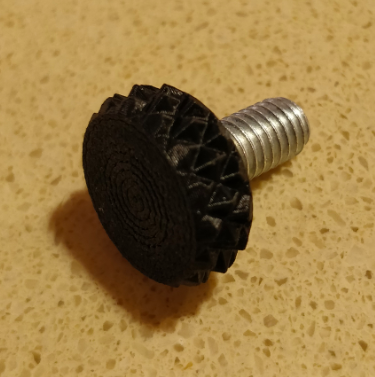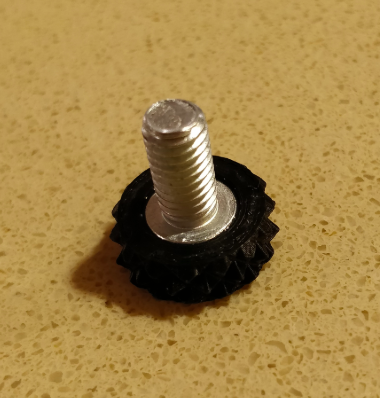Thumbscrews are useful for things you want to take apart/adjust by hand, such as guitar pedals, cases, clamps, and microphone stands.

I often find myself wanting a thumbscrew for something that didn’t come with them, but I’m too impatient to order one or visit the hardware store, especially when I have a bunch of perfectly-good matching machine screws around the house. So why not make them?
In the past I’ve modeled thumbscrew caps in Fusion 360, 3D printed them, and glued them to the tops of the screws with epoxy, which works surprisingly well for reasonably high-torque applications. However, I got sick of doing this for every specific screw, so finally dove into learning OpenSCAD. This open-source CAD platform is essentially a programming language for modeling in 3D. The main benefit of this approach is that it allows you to set sizing variables for customizing objects. For simple shapes like this one, it was a good learning project.
There’s also a lot of community libraries for complex modeling features that I’m not smart enough to come up with myself. I was able to find one that renders knurling on the edges of a cylinder. With this, I could ensure the sides were grippy and pretty cool-looking too!

If you need your own customized thumbscrew cap, the thingiverse link is below. Click “Customizer” to open a screen where you can adjust the parameters to match the measurements of your machine screw. This includes things like the diameter/depth of the head, and the shape/dimensions of the screw’s drive. There is a matching indentation inside the cap to give some extra grip to the screw head.
https://www.thingiverse.com/thing:3902005
Obviously when applying super-high torque, the glue might not hold up. But I’ve found that you don’t encounter this in most situations where you’re using your relatively feeble hands in lieu of a screwdriver. But there are other designs for hex bolts out there too, which should be much more strong:
As for figuring out the threading on a particular screw, the cheap way is to try it on a bunch of nuts in your toolbox until you find a match. Or you could use a thread pitch gauge (probably should have both metric and imperial options).